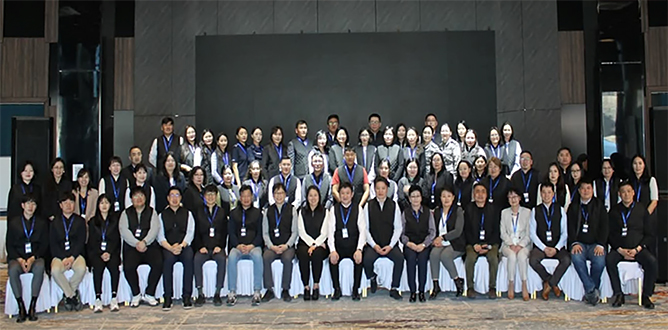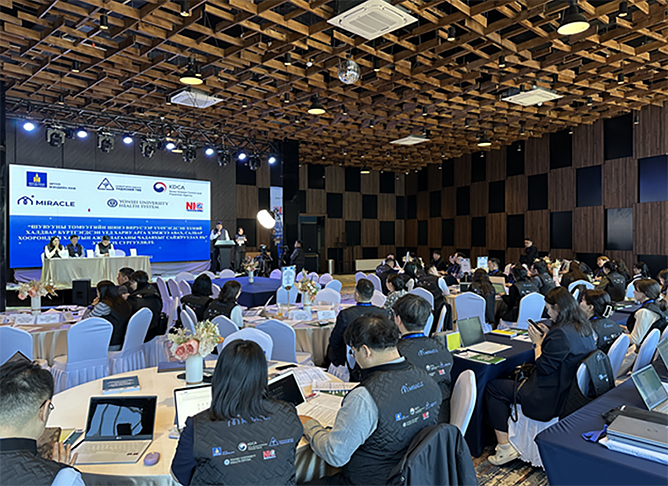
GHSCO Newsletter
June 2025
Volume2 Number2
GHSCO Updates3
Mongolia’s Readiness for Emerging Infectious Disease Improved by Joint Simulation Exercise
Project Overview: Strengthening Mongolia’s Infectious Disease Control System
Since 2023, the Korea Disease Control and Prevention Agency (KDCA) has been supporting Mongolia through an Official Development Assistance (ODA) project aimed at enhancing the country’s capacity to prepare and respond to infectious diseases. This project focuses on several key areas:
- Antimicrobial Resistance Surveillance
- Field Epidemiology Training
- Simulation Exercises for Emerging Infectious Diseases
- Knowledge Exchange and Transfer of Surveillance and Diagnostic Technologies from the Republic of Korea (ROK).
 Group Photo of Simulation Exercise
Group Photo of Simulation Exercise
The Simulation Exercise
As a key part of the project, a scenario-based simulation exercise was conducted from April 21 to April 22, 2025. The exercise was based on a hypothetical human case of avian influenza. A "whole-of-government" approach to preparing for infectious disease outbreaks extends beyond just disease control authorities, encompassing a wide array of relevant ministries and agencies. The goal is to ensure a coordinated and integrated response, particularly in emergencies where multi-agency coordination might be unfamiliar territory for Mongolia. Therefore, it is essential to conduct simulation exercises that involve multiple sectors, allowing various government bodies to practice joint response efforts and ensure rapid action when a real crisis emerges. This collaborative training helps to streamline communication, clarify roles and responsibilities, and build a unified front against public health threats that require a comprehensive national effort. The simulation was hosted by Mongolia’s National Center for Communicable Diseases (NCCD) with technical support from the KDCA. 74 working–level staff from around 20 Mongolian agencies participated, including representatives from the Ministry of Health, National Emergency Management Agency, and General Authority for Veterinary Services. This simulation offered participants the crucial opportunity to:
- Review Scenario-Based Response Procedures
- Clarify the Specific Responsibilities of Each Agency in the Event of Suspected Avian Influenza Cases
- Practice Swift Risk Assessment and Information Sharing
- Refine Strategies for Case Management and Multi-Agency Risk Assessment Process
- Address Misinformation Management and Public Communication with the Media.
 During the Simulation Exercise
During the Simulation Exercise
Key Findings and Insights
The simulation accurately reflected a real outbreak scenario and proved it to be highly valuable. It revealed critical gaps in the early response system while allowing for a comprehensive evaluation of the whole-of-government coordination mechanism. Although participants gained a deeper understanding of national guidelines and crisis management protocols, several key challenges were identified:
- Unclear Definition of Agency Roles during the Initial Response Phase
- Inadequate Mechanisms for Timely Information-Sharing among Involved Parties
Future Directions and Ongoing Support from KDCA
Drawing on lessons learned, the NCCD and the Ministry of Health Mongolia plan to revise the national framework for responding to emerging infectious diseases. The revised framework will focus on:
- Clearly Defining the Responsibilities of Each Agency
- Enhancing Real-Time Information Sharing among Stakeholders
Regular scenario–based training plays a vital role in identifying systemic gaps and developing practical solutions for future outbreaks. Going forward, the KDCA will continue to share its knowledge and experience with the NCCD, thereby ensuring sustainable capacity building and fostering effective cooperation to strengthen Mongolia’s infectious disease preparedness and response systems.